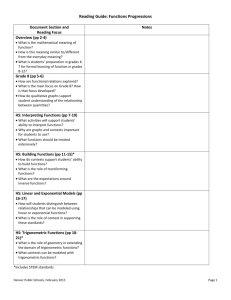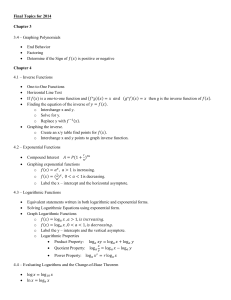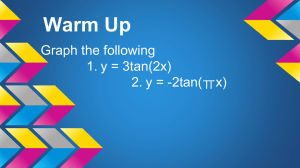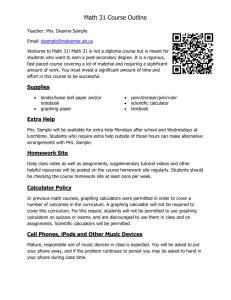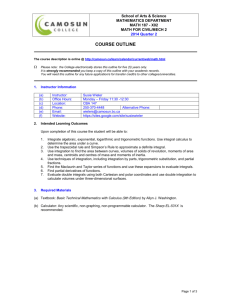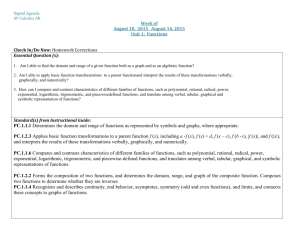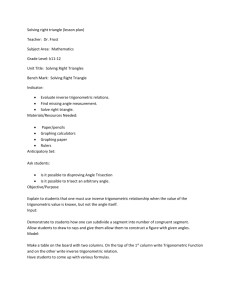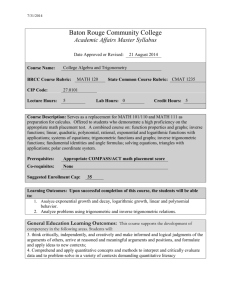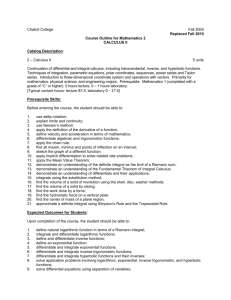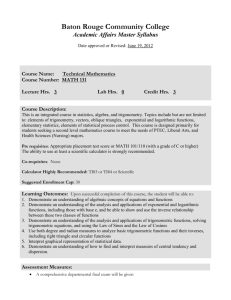MA 161
advertisement
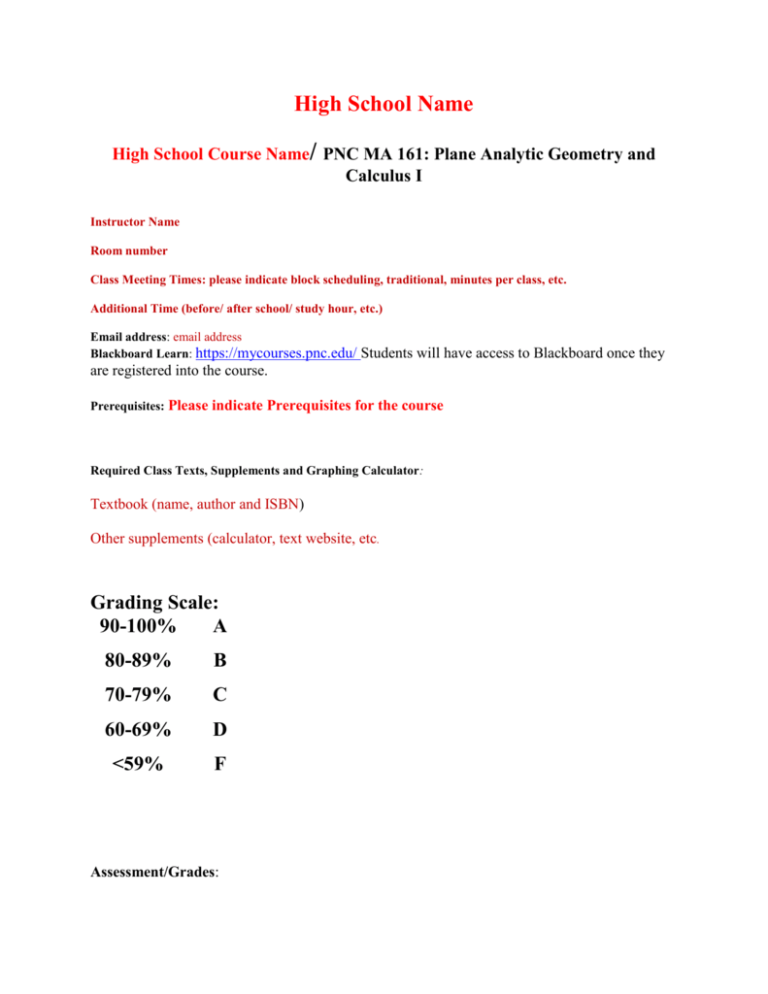
High School Name High School Course Name/ PNC MA 161: Plane Analytic Geometry and Calculus I Instructor Name Room number Class Meeting Times: please indicate block scheduling, traditional, minutes per class, etc. Additional Time (before/ after school/ study hour, etc.) Email address: email address Blackboard Learn: https://mycourses.pnc.edu/ Students will have access to Blackboard once they are registered into the course. Prerequisites: Please indicate Prerequisites for the course Required Class Texts, Supplements and Graphing Calculator: Textbook (name, author and ISBN) Other supplements (calculator, text website, etc. Grading Scale: 90-100% A 80-89% B 70-79% C 60-69% D <59% F Assessment/Grades: Category Percentage Final Exam 25% Grading Categories (exams, quizzes, etc.)- put each category on a different line Percentage for each category ATTENDANCE POLICY: Please state your attendance policy HOMEWORK POLICY: Please state your homework policy GRADING POLICY: A straight grade will be used, there are no plus or minus grades in this course for the PNC grade. Any additional grading policy MAKE-UP TEST AND LATE ASSIGNMENT POLICY: Please indicate the exam make-up and late assignment policy. Learning Outcomes Upon successful completion of this course students will be expected to High School Please indicate the learning outcomes Purdue North Central 1. Compute limits of algebraic, trig, exponential, logarithmic, inverse trig, and piece-wise defined functions. 2. Use limits to solve a range of applications, including (among others): limits of difference quotients as slopes of tangents and instantaneous rates of change, infinite limits and limits at infinity as related to asymptotes of graphs of functions and various physical applications. 3. Apply various limit theorems and solve a range of related applications, including (among others): the Intermediate Value Theorem and the Squeeze Theorem. 4. Use the graph of a function to estimate its derivative. 5. Find the derivative of an algebraic function using the limit of a difference quotient. 6. Use the derivative of a function to sketch a possible graph of the function. 7. Use the graph of a function to sketch its derivative. 8. Compute derivatives of algebraic, trigonometric, exponential, logarithmic, inverse trigonometric functions using the basic differentiation rules, including: constant function, sum/difference, constant multiples, power of a variable, product and quotient rules, and the chain rule (especially the special case as the extended power rule). 9. Determine the continuity and differentiability of a function at a point and on a set. 10. Compute derivatives of algebraic, trigonometric, exponential, logarithmic, inverse trigonometric using implicit differentiation, and solve related applications (especially rates of changes, slopes of tangents, and related rates). 11. Use the derivative(s) of a function to determine the properties of the graph of the function. 12. Use derivatives to solve a range of mathematical application problems, including (among others) those related to: rates of change, optimizations problems, linear approximation and differentials, the Mean-Value Theorem. 13. Use derivatives to compute limits using L'Hôpital's Rule. 14. Use Newton’s Method to approximate zeros of a function. 15. Compute antiderivatives of algebraic, trigonometric, exponential, logarithmic, inverse trigonometric, and solve a broad range of applications. 16. Compute indefinite integrals of algebraic, trigonometric, exponential, logarithmic, inverse trigonometric using formulas and substitution, and solve a range of applications. 17. Compute Riemann Sums and interpret in the context of a given problem situation, including as an area and net area, 18. Understand and be able to apply the Fundamental Theorem of Calculus, and solve a range of applications. 19. Use the properties of definite integrals to manipulate definite integrals in problem solving. 20. Compute definite integrals of algebraic, trigonometric, exponential, logarithmic, inverse trigonometric using formulas and substitution, and solve a range of applications, including. 21. Solve problems mathematical applications using the definite integral including those related to: even and odd functions; areas and net area; average values of functions; position, velocity, displacement and distance, net change and future value, acceleration; and areas of regions between (bounded by) two (or more) curves. 22. Use appropriate modern technology to explore calculus concepts. High School Course MA 161 Course Outline PNC MA 161 High school math course outlineplease identify the topics that you cover in the course. Functions Review of Functions Representing Functions Inverse, Exponential, and Logarithmic Functions Trigonometric Functions and Their Inverses Limits The Idea of Limits Definitions of Limits Techniques for Computing Limits Infinite Limits Limits at Infinity Continuity Precise Definitions of Limits Derivatives Introducing the Derivative Working with Derivatives Rules of Differentiation The Product and Quotient Rules Derivatives of Trigonometric Functions Derivatives as Rates of Change The Chain Rule Implicit Differentiation Derivatives of Logarithmic and Exponential Functions Derivatives of Inverse Trigonometric Functions Related Rates Applications of the Derivative Maxima and Minima What Derivatives Tell Us Graphing Functions Optimization Problems Linear Approximation and Differentials Mean Value Theorem L’Hopital’s Rule Newton’s Method Antiderivatives Integration Approximating Areas under Curves Definite Integrals Fundamental Theorem of Calculus Working with Integrals Substitution Rule Applications of Definite Integrals Velocity and Net Change Disability Accommodations Statement: As a CEP student, you are required to follow the PNC policy for disabilities. Purdue University North Central is committed to providing all students equal access to learning opportunities. Students with a documented disability that either prevents them from fully participating in any aspect of this course, or that require an accommodation should contact the instructor within the first two weeks of this course. Students who have self-identified and who have appropriate documentation (from a medical professional) that has been verified through the PNC Disability Services Coordinator, (located in LSF 103 or by phone at 219-785-5374), will be given accommodations for this course . It is the student's responsibility to request an accommodation and schedule their exams with the Student Success Center, professor, or Disability Services Coordinator. Course Evaluation Course evaluation for each course is done online. After the 12th week of the semester you will receive emails asking you to fill out the course evaluation for each course on line. There may be in-class reminders for completing the online evaluation. IT IS VERY IMPORTANT THAT YOU COMPLETE THE COURSE EVALUATION since your feedback is important for improving the course. Academic Integrity As a PNC-CEP student, you are responsible for following PNC’s academic integrity policy. Academic Integrity is a core value of our community. Academic honesty and appropriate classroom behavior are the responsibility of each PNC student. Students who are found to be in violation of the academic integrity policy will be subject to both academic and non-academic sanctions such as failing grade in the class and/or in cases where the student may have a pattern of misconduct with the University, the student may be separated from the University because of this behavior. You are expected to be familiar with the University’s Code of Conduct and possible sanctions. You can access this document on the Dean of Students webpage under University and Campus Policies/Student Conduct, Disciplinary Procedures and Appeals, or at: http://www.pnc.edu/Policy/conduct. Students should also make themselves aware of an addendum covering classroom disruption which can be found at: http://www.pnc.edu/academic_affairs/wp-content/uploads/sites/20/2013/05/Disruptionin-Classroom-Policy.pdf. Students should understand that if you are charged with an offense, pleading ignorance of the rules will not serve as an excuse. You need to make yourself familiar with these university documents. Any questions you may have can be directed to the Dean of Students. Counseling Services Short term confidential counseling is available to enrolled students free of charge through the Student Counseling Services office located in LSF 103. The phone number is 219785-5230 or 1-800-872-1231 ext. 5230. Students may call or stop in to make an appointment Monday through Friday 8:00 AM to 4:30 PM.
